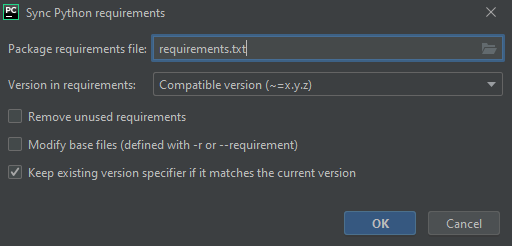https://github.com/alanngo/MongoDB
$ sudo pip3 install -r requirements.txt- Tools => Sync Python Requirements
- Make sure your settings match image below
from flask import *
from flask_cors import *
app = Flask(__name__)
@app.route('/', methods=['GET'])
def index():
return "hello world"
if __name__ == '__main__':
CORS(app) # lets other programs consume app
app.run(debug=True)# foo will execute if a GET or POST request is made with 'pancakes' in the URL
# 1st argument: route name. 2nd argument: API requests
@app.route('/pancakes', methods=['GET', 'POST'])
def foo(): # EX: http://localhost:5000/pancakes
return "pancake jokes are so flat"
# functions decorated w/ @app.route CAN ONLY return the following...
# - string (HTML)
# - dictionary (JSON)
# - tuple
# - Response instance
# - WSGI callable# to inject a path variable, use '<>'
# argument name in foo must match argument name in app.route
# in foo, 'key' is our path variable that we substitute in the URL
@app.route('/computers/<key>', methods=['GET'])
def foo(key): # EX: http://localhost:5000/computers/windows
table = \
{
"chromebook": "terrible",
"mac": "good but too expensive",
"pc": "amazing"
}
return {key: table[key]}
# you can also inject multiple path variables
# make sure the names in '<>' in app.route match the functions argument ver batim
@app.route('/company/<arg0>/<arg1>', methods=['GET'])
def bar(arg0, arg1): # EX: http://localhost:5000/company/shantanu/infosys
return f"Hello My name is {arg0}, I work at {arg1}"# leave the route alone
@app.route('/ut', methods=['GET'])
def data(): # EX: http://localhost:5000/ut?subject=research
fav_subject = request.args['subject'] # this line of code is important
return f"6627 56837 {fav_subject}"@app.route('/', methods=['GET'])
def foo():
# THIS SNIPPET IS REQUIRED TO LOAD JSON DATA
obj = request.get_json()
return obj@app.errorhandler(Exception) # this advice handles all errors
def handle_general_error(e: Exception):
message = str(e)
return {"Error": f"{message}"}, 400
@app.errorhandler(RuntimeError) # this advice handles all instances of runtime errors
def handle_runtime_error(e: RuntimeError):
message = str(e)
return {"RuntimeError": f"{message}"}, 404
@app.errorhandler(ValueError) # this advice handles all instances of value errors
def handle_value_error(e: ValueError):
message = str(e)
return {"ValueError": f"{message}"}, 403- Step 1
$ cat flask_init.sh >> ~/flask_init.sh- Step 2
$ echo "alias flaskgen='bash ~/flask_init.sh'">>~/.bashrc- Step 3: Close and restart terminal
- run
$ flaskgen <PROJECT_NAME>to create a flask project

